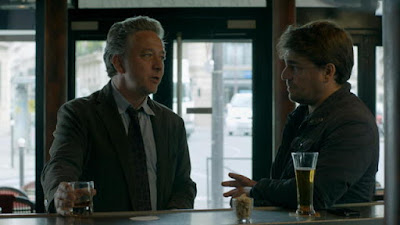What a brilliant idea coupled to just-about-perfect follow-through is the delightful French cable series, CALL MY AGENT (Dix pour cent), available now on Netflix streaming. The idea is so good, in fact, and so original -- I don't recall its ever being done anywhere before -- that one wonders why Hollywood hasn't immediately co-opted it. The series tells the story of a somewhat large and successful agency for French film stars and the staff who work there.
While we get to know that staff and their lives, each episode actually revolves around a different French movie star, playing him- or herself, struggling with a particular problem -- from aging and the need for a little Botox to love and fidelity, child care, dementia, and just about any/everything else you might imagine.
The brainchild of writer Fanny Herrero, shown at left, with some help from director/producer Cédric Klapisch (he directed two of the initial episodes and helped produce a half dozen of them), the series is one of the most consistently entertaining, enthralling, funny, sweet and all-round-delightful shows TrustMovies has lately encountered. It's up there with Crazy Ex-Girlfriend and Imposters (season one, anyway; I have not yet seen season two).
Why Hollywood hasn't done this probably involves how huge, often ugly, heartless and far too humorless La La Land actually is. The French film industry, at least according to a number of its actors whom I've interviewed over the years, is just small and cozy enough -- like maybe a great big family, with all the warmth, anger, differences and ups-and-downs most families encounter -- to make a series like this one actually kind of plausible.
When I first began watching the series, while I loved each episode and every sparking moment, I also wondered how folk not as familiar as I with French films and their stable of actors might react to it. For many Americans, even those who occasionally attend foreign films, their knowledge of French movie stars may begin and end with Isabelle Adjani or Juliette Binoche (and, yes, both these stars get an episode here). So far, however all those people to whom I've recommended Call My Agent have fallen in love with it, too.
Ms Herrero has managed to create, via her agents and their helpers (shown on poster, top, and in the photos above), a group of people with whom we fall in love and are happy to stick with through thick and thin.
Ms Binoche, above, gets to end the second season with an episode that finds our agents at the Cannes Film Festival, and it shows off this actress' ability for goofy humor in a manner than Bruno Dumont could learn from.
Along the way we see actors such as Virginie Efira and Ramzy Bedia (above), the great François Berléand (below, playing Don Juan opposite a large, plastic yellow duck),
and the versatile Audrey Fleurot (of Spiral and the new Netflix series, Safe) as a recent mother who, below right, must learn to pole dance for her next role.
Each of the problems that confront these actors is so well-chosen and different, one from the next, that interest and enjoyment never flag. Further, each famous actor gives herself/himself over so completely to whatever is at hand that your respect and admiration for these "stars" should only increase.
That's Line Renaud and Françoise Fabian (left to right, above) as feuding old acquaintances, and Cécile de France (below, center) as the actress facing the perennial face-lift challenge.
Call My Agent can be seen now on Netflix, in its first two seasons. We fans are now eagerly awaiting season three.























































